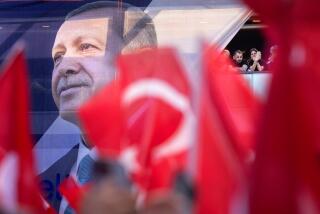Turkey’s ‘No’ Vote on Iraq Pays Off
- Share via
When Turkey refused to help the United States fight the war against Iraq, it did so with some ambivalence.
Its parliamentary “no” to the U.S. was hardly enthusiastic and came about partly because Turkey’s new Islamist regime caved to Turkish public opinion. The politically important Turkish military, which might otherwise have been inclined to help its old allies in the United States, was angry at the heavy-handed way in which America demanded support; therefore, it declined to lobby much for Washington’s request. And some elites in Turkey bemoaned the “no” decision at the time, arguing that it would cost Turkey at least $6 billion in U.S. grants and would lose it a place at the table in presiding over postwar Iraq.
But over time, Turks have grown much more comfortable with their rebuff to Washington, which seems to have had several positive effects. For one thing, Turkey’s “no” vote raised the country’s stock in Europe as a potential European Union candidate, as it showed that Ankara is indeed no mere stalking horse for U.S. interests.
For another, the Arab world, whose population was extraordinarily hostile to the war, watched its own unelected dictators kowtow in fear to Washington while Turkey’s democracy reflected and legitimized its antiwar vote -- a forceful lesson to Arabs about the legitimizing power of democratic institutions. Though the Bush administration can be angry about Turkey’s lack of support, it can hardly punish the country over the parliamentary vote in a genuinely democratic process.
Turks as a whole feel more empowered and independent because of these events.
Indeed, many Turks who had feared their country had lost a golden opportunity in not cooperating with Washington on Iraq have learned that there indeed was no “table” in postwar Iraq at which benefits of occupation might have been parceled out; control has been tightly retained in Washington.
And Turkish discontent with Washington has risen further since the U.S. refused to let Turkey become involved in the Kurdish region of northern Iraq after the war. In U.S. eyes, any Turkish presence in this sensitive area would only lead to a Turkish-Kurdish confrontation.
Turks were further disappointed with the U.S. failure to stop Kurdish forces from moving into the Kirkuk region, which Turkey said was an unacceptable extension of Kurdish power into the oil zone that strengthened Kurdish self-reliance and autonomy.
Turkey deeply fears that a Kurdish state -- or even a federalized Iraqi state -- would stimulate demands for greater autonomy among Turkey’s own large Kurdish population.
During a recent trip to Turkey, I heard widespread suspicions about U.S. intentions; many fear that Turkey itself might be the next victim of some unspecified power play as Washington boldly reshapes the region. Anti-Americanism is running high and has led to an unprecedented informal coalition between the Turkish left and Turkish right-wing nationalists. These groups are united in their hostility toward the U.S. and see entry into the EU as a compromise of Turkish sovereignty. Ironically, the Islamists remain champions of the EU bid. All this represents a dramatic transformation.
As if these things were not enough, U.S. forces early this month arrested 11 members of Turkey’s special forces in Iraq on suspicion of planning to assassinate the Kurdish leader of Kirkuk. The facts have yet to emerge, but the rough and unfriendly treatment these officers received created a firestorm in Turkey. Why, Turks have asked, did the U.S. not communicate to an ally any misgivings about intelligence it may have received?
Washington is widely perceived in Turkey as a rogue actor with arrogant and hostile intentions toward basic Turkish national interests. Though not all of this may be accurate, perceptions are everything. Ankara is discussing whether its future lies any longer with Washington, or perhaps instead with some emerging coalition of the EU and other major regional powers like Russia, China and India -- countries that actively seek to balance what they see as unbridled U.S. power.
More to Read
Sign up for Essential California
The most important California stories and recommendations in your inbox every morning.
You may occasionally receive promotional content from the Los Angeles Times.













